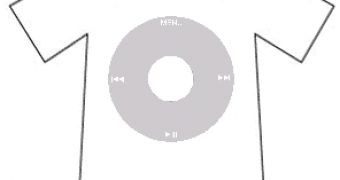Check this! Researchers over at Georgia Institute of Technology say that T-shirts with built-in nanotechnology may soon power up your mp3 player. Imagine not depending on power sockets at home or at work to power up your iPod! As it always goes, a mechanical process converts into energy, and this time it's the movement of clothing fibers.
You're probably wondering at this point, "so all you have to do basically, is wear the T-shirt, walk around and that's it? It can't be that easy, can it?" No, of course it can't. Otherwise this would have been breaking news and you don't see any "breaking" sign anywhere near the headline, do you?
Researchers claim that pairs of textile fibers covered with zinc oxide nanowires can generate electricity in response to applied mechanical stress, according to pcadvisor.co.uk. The phenomenon is scientifically referred to as "piezoelectric effect" (lighters use that, if I'm not mistaking). Here's how researchers described their invention: "the resulting current flow from many fibre pairs woven into a shirt or jacket could allow the wearer's body movement to power a range of portable electronic devices", said the National Science Foundation (NSF), which funded the project. According to the same source, hikers and military personnel in service are the real world scenarios ('cause of all the movement involved).
Of course, no one even bothers to ask themselves whether 1. the army lets you listen to your mp3 player while climbing fences and 2, whether you even have time to listen to music at all. Anyway, researchers also claim their findings aren't limited to shirts. Curtains, tents or any other fabric subject to movement would work just as well.
"The two fibres scrub together just like two bottle brushes with their bristles touching, and the piezoelectric-semiconductor process converts the mechanical motion into electrical energy," explained Zhong Lin Wang, a Regents professor in the School of Materials Science and Engineering at the Institute. "Many of these devices could be put together to produce higher power output."
According to the same source, "the only set back to the research" is that zinc oxide is sensitive in water. Ohhh! There goes all the excitement. So, not only do you have to keep your stinkin' army clothes dry, but you also have to keep a window open all the time too to keep electrical energy coming. I don't know, too much fuss over 80 milliwatts of power if you ask me. But hey, at least we know it's doable.

 14 DAY TRIAL //
14 DAY TRIAL //